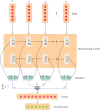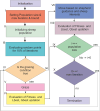Smart wearable sensor-based model for monitoring medication adherence using sheep flock optimization algorithm-attention-based bidirectional long short-term memory (SFOA-Bi-LSTM)
- PMID: 40520140
- PMCID: PMC12163270
- DOI: 10.1177/20552076251349692
Smart wearable sensor-based model for monitoring medication adherence using sheep flock optimization algorithm-attention-based bidirectional long short-term memory (SFOA-Bi-LSTM)
Abstract
Objective: Medication adherence (MA) is crucial to patient treatment and vital for therapeutic outcomes. Due to its ability to continuously monitor a patient's MA behavior, the recent focus on sensor technology for MA monitoring is a promising development. The primary objective of this research is to implement sensor devices/smart wearables powered by advanced deep learning (DL) techniques to evaluate complex data patterns effectively and make accurate predictions. This study introduces a novel smart wearable sensors-based hand gesture recognition system to predict medication behaviors.
Methods: A device equipped with accelerometer and gyroscope sensors acquires and analyzes data from hand motions. A mobile app records the data from the smart device, subsequently storing it in a database in .csv file. The data is gathered, preprocessed, and classified to identify MA behavior utilizing the developed DL model known as the sheep flock optimization algorithm-attention-based bidirectional long short-term memory network (SFOA-Bi-LSTM). The data was initially gathered and preprocessed via the Z-score normalization method. The data samples are classified using the attention-based Bi-LSTM model after undergoing preprocessing. The SFOA method was utilized to optimize the hyperparameters of the attention-based Bi-LSTM model.
Results: The model's performance was examined using a five-fold cross-validation based on recall, accuracy, F1 score, and precision. The SFOA-Bi-LSTM model achieved 98.90% accuracy, 97.80% recall, 98.80% precision, and 98.62% F1 score, demonstrating its novelty and potential to inspire and motivate healthcare professionals to adopt this promising method for monitoring MA in healthcare applications.
Conclusion: The results indicate that the SFOA-Bi-LSTM model performs well in predicting MA. The SFOA-Bi-LSTM model offers several unique advantages, including efficient hyperparameter tuning via the SFOA, enhanced feature representation through an attention mechanism, and comprehensive temporal analysis using Bi-LSTM. It demonstrates superior performance compared to conventional models while being robust to noisy data due to effective preprocessing.
Keywords: Bi-LSTM; Medication adherence; SFOA; Z-score normalization; deep learning; smart wearable sensor.
© The Author(s) 2025.
Conflict of interest statement
The authors declared no potential conflicts of interest with respect to the research, authorship, and/or publication of this article.
Figures











References
-
- Aldeer M, Javanmard M, Martin RP. A review of medication adherences monitoring technologies. Appl Syst Innovat 2018; 1: 14.
-
- Wellington K, Absalom EE. Machine learning approach to medications adherences amongst NCD patient: a systematic literatures review. Inf Med Unlocked 2023; 38: 101210.
LinkOut - more resources
Full Text Sources

